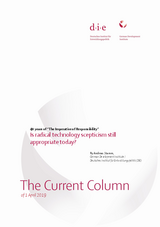The Current Column
40 years of “The Imperative of Responsibility”
Is radical technology scepticism still appropriate today?
Stamm, AndreasThe Current Column (2019)
Bonn: German Development Institute / Deutsches Institut für Entwicklungspolitik (DIE), (The Current Column of 1 April 2019)
Bonn, 1 April 2019. Forty years ago, the book “Das Prinzip Verantwortung” (“The Imperative of Responsibility”) by Jewish philosopher Hans Jonas was published for the first time. Even though today the author is no longer a household name, Jonas has had a significant influence on the debate on environmental, energy and technology policy in Germany and beyond. The central thesis of his work is the “ecological imperative”, which he was the first to formulate explicitly. Inspired by Immanuel Kant, this is: “Act in such a way that the effects of your action are compatible with the permanence of genuine human life on earth.” Since the 1970s, the growing threat to human existence – for example from global environmental changes – has become increasingly apparent. Placing the concerns associated with this within a responsible ethical framework is Hans Jonas’s great achievement. In view of eroding planetary boundaries, however, it is uncertain whether his statements about a responsible choice of technology are still completely valid today. Hans Jonas sees technological progress – especially when it brings about fundamental innovations – primarily as a danger and, when deciding on the use of a technology, advocates always assuming the worst acceptable scenario. Forty years on, however, we must note in the cold light of day that the limits of ecosystems’ resilience are not being exceeded primarily by singular events relating to new technologies. Since the publication of “The Imperative of Responsibility”, the global population has grown by more than 3 billion. The proportion of people living in absolute poverty has fallen from 40 to 10 per cent worldwide. This means that people’s material needs are being increasingly satisfied – which is desirable. However, this is leading for instance to the expansion of agricultural land at the expense of forests and biodiversity, especially with traditional techniques such as slash-and-burn agriculture. Climate change, too, can only be interpreted as a consequence of technological change if we consider the burning of fossil fuels on an industrial scale, which is well over a hundred years old, to be a new technology. We must therefore ask whether the ecological imperative cannot also go hand in hand with the use of rather unpopular technologies – at least if these have undergone a technology assessment based on science and ethics. This is the case, for example, when a more productive agriculture can guarantee food security in the same area despite climate change, or when bridging technologies make it possible to develop broadly applicable sustainable solutions, as in the case of energy supply. Two examples illustrate how difficult it is when choosing technology both to take the scientific evidence of its positive and negative effects into account and to reflect these effects in a suitably ethical manner. A few years ago, for example, Germany abandoned the experimental testing of carbon capture and storage (CCS) even before it had really begun. The main reason was not a well-founded cost-benefit-risk assessment but a vague unease about this large-scale technology. One fear was that stored CO2 could find its way back to the surface unchecked. However, this has never yet happened with experimental CCS systems. Expanding the use of renewable energies is undisputedly the order of the day. However, even if it were possible to switch all electricity generation to renewable energies, CCS would be the only way to avoid emissions from industrial processes. Even more importantly, without significant CCS research, Germany will be out of contention as a partner for developing countries that have to rely heavily on fossil fuels and are highly unlikely to switch rapidly to renewable energies for economic and social reasons. This applies to countries such as South Africa and India, whose greenhouse gas emissions make up an increasing part of the global total. South Africa has been pursuing its own CCS strategy for years. The country would certainly be interested in cooperating with Germany, which traditionally has a strong research base. New genetic engineering methods (gene editing, CRISPR-Cas9) are being rejected in Germany in a similar way to classic genetic engineering. However, some biotechnology experts believe that gene editing is low-risk and can accelerate conventional plant breeding in particular, while being more targeted and resource-efficient. They also claim that the technology has the potential to increase CO2 absorption by trees as well as the resistance of crops to the consequences of climate change, both of which are desirable for climate and development policy reasons. From today’s point of view, the ecological imperative must certainly be combined with openness towards new technologies. At the very least, far-reaching legal and regulatory decisions that prevent their use should be based on an assessment of benefits and risks rooted in science and ethics to a greater extent than it has been to date. As technologies increasingly respond to global challenges, technology assessments should also be carried out at a multilateral level. Developing such approaches is what needs to happen now.
DIE also organises a lecture series on this topic: Forty years after the „Imperative of Responsibility“ – Ethics of technology in times of eroding planetary boundaries


